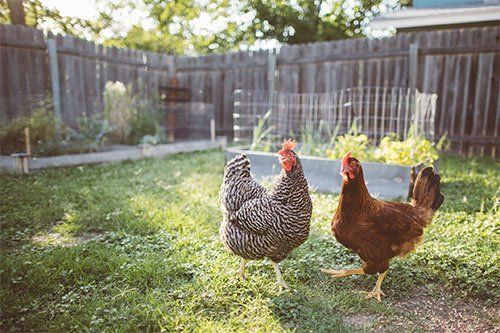Pros And Cons Of Different Fence Materials For Backyard Chickens
The United States Postal Service shipped 1.2 million pounds of packages that contained live chicks in just six months. With a greater interest in being self-reliant for food sources, many people across the country are taking interest in raising their own backyard chicken flock. Yet, keeping backyard chickens is something that will require a few property modifications, specifically, a fence.
People invest in a perimeter fence for their residential properties for many reasons, but if you have free-roaming chickens, a fence becomes a necessity to keep your flock protected. Not every type of fence is fitting for chicken-keeping purposes. Look at a few of the most common types of fence materials and the pros and cons of each where protecting chickens is concerned.
Chain-Link Fencing
Chain-link fencing is highly prized for its durability and security. If you would like it to have a more aesthetically pleasing appearance, then you can coat this fence with a colored PVC material.
Pros
Chain-link fencing can be really effective at keeping chickens inside of your fenced property perimeter. Plus, you can install it high enough that chickens would have a difficult time flying over the top and large predators will not be able to get through.
Cons
On the downside, chain-link fencing has the trademark link style, and chickens can and will climb up the fence if they are determined to get out. Additionally, the open links can be an open invitation for small predators who want to get to your chickens.
Wood Fencing
Wood fencing is one of the most traditional residential fence styles, and it comes in many versions. From basic property barriers with posts and two or three horizontal slats to tall privacy fences, wood fences take many shapes.
Pros
Wood fencing can be an excellent choice for protecting your chickens but only wood fences that are designed primarily for privacy because they are solid. Most chickens with unclipped wings can only fly a few feet off the ground, but some smaller breeds can fly over 6 feet. Wooden privacy fences are one of the few fences that look nice at such a stature.
Cons
If you choose wood fencing, then you’ll have to properly bury it to prevent predators from digging under to get to your flock. Unfortunately, not all wood stands up well to consistent moisture exposure underground. Therefore, a wooden privacy fence is only feasible for chicken protection if you also install a skirt of metal wiring along the base beneath the ground.
Ornamental Iron Fencing
Ornamental iron fencing comes in an array of styles, but the most common consists of tall vertical bars that are connected to a lower horizontal bar for stability or a synthetic rock base. Ornamental fencing can be tall or short depending on your style preferences.
Pros
Ornamental iron fencing can be really good for chicken keeping for a few reasons. For one, the vertical bars can be close enough together that it would be hard for the chickens to fit through them. Plus, the vertical-bar design would be practically impossible to climb for a chicken because of the grip-free texture of the bars.
Cons
Iron fencing that has vertical slats may not suffice to keep predators out. Rats, snakes, and other small animals that commonly prey on chickens can fit between bars.
Choosing a fence for your property is always a big decision. With a flock of backyard chickens, your fencing choice becomes even more important. If you need help selecting the right fence to keep your chickens protected, then reach out to us at
Gulf Coast Fence Co. for professional assistance.







